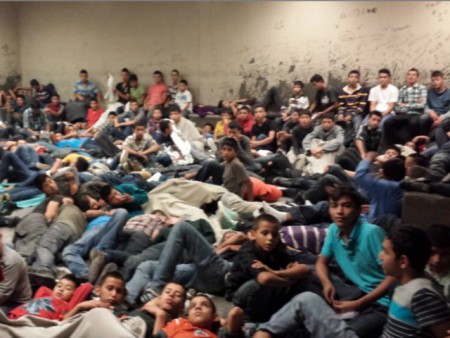By Rebecca K. Smith, CLDC Board President & Cooperating Attorney
Last week, a federal court in California held that holding immigrant children from Central America in jail during their immigration proceedings was unlawful because it violates the terms of a nation-wide policy established almost 20 years ago. The court found that the failure to release children, the failure to keep children in a non-secure and licensed child care facility, and the deplorable conditions of holding cells all violate the terms of the government’s own policy on detention of immigrant children.
Beginning in 2014, U.S. Immigration and Customs Enforcement (ICE) began enforcing a policy of detaining undocumented immigrant mothers and their children from Central America in unlicensed detention centers during proceedings to determine whether they could remain in the U.S. There is no possibility for these mothers or children to be released on bond, recognizance, supervision, or parole if they are from Central America.
In a previous class action settlement agreement and consent decree, known as “Flores,” ICE had agreed to a nation-wide policy for detention, release, and treatment of immigrant children in its custody. One term of this policy requires release of children, so long as there is a qualified adult custodian to care for them. The qualifying adult could be an individual who lives in the U.S., or it could be an individual who is being detained but would not create a flight or safety risk upon her release. In breach of the agreement, ICE’s new policy prohibits the release of children even if there is a qualified adult available to take care of the children.
A second critical term of the consent decree requires that if there is no qualifying adult to take care of the child, the child must be placed in a “non-secure” facility that is licensed to care for children, such as a residential group home or foster home. In breach of the agreement, ICE’s new policy is to detain children and their mothers in a jail-like “secure” facility that is not licensed for child care. Children are essentially locked up and not permitted to leave. This type of confinement can inflict long-lasting psychological, developmental, and physical harm on children.
A third critical term of the consent decree requires that when children are apprehended by Border Patrol, they must be housed in “safe and sanitary” holding cells until they are transferred to ICE. In breach of the agreement, ICE’s new policy allowed children to be held in overcrowded, unsanitary cells with inadequate temperature control and bedding, inadequate drinking water and food, and sleep-depriving bright lights on 24 hours a day. Due to over-crowding, in some cells children were forced to sleep standing up or not at all. The court found these conditions “deplorable.”
In the court proceedings, ICE had argued that the Flores consent decree did not apply to children who are detained with their mothers. The federal court rejected this argument because the agreement states that it applies to “all minors,” regardless of whether they are accompanied by an adult.
Further, the court rejected ICE’s request to change the terms of the consent decree to make the agency’s conduct retroactively lawful. The court held: “It is astonishing that Defendants have enacted a policy requiring such expensive infrastructure without more evidence to show that it would be compliant with an Agreement that has been in effect for nearly 20 years. . . . It is even more shocking that after nearly two decades Defendants have not implemented appropriate regulations to deal with this complicated area of immigration law.”
The court concluded that ICE was violating the consent decree, and ordered that within 90 days, unless ICE shows cause otherwise, ICE must comply with the agreement by either releasing the jailed children or placing them in a licensed child care facility according to the terms of the consent decree. The court also held that ICE must propose standards to ensure the holding cells are safe and sanitary in a manner that complies with the consent decree.

